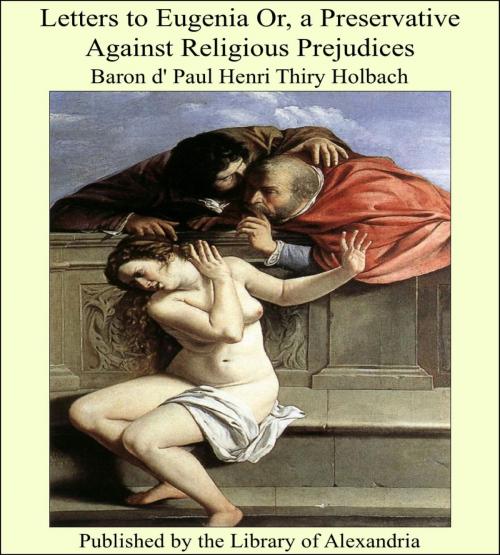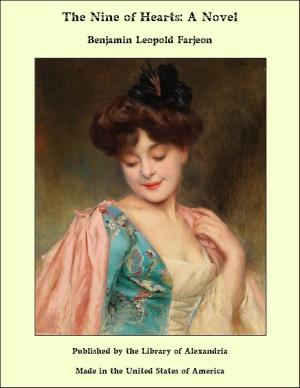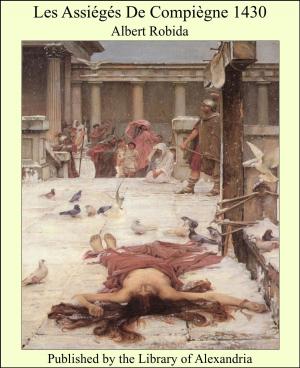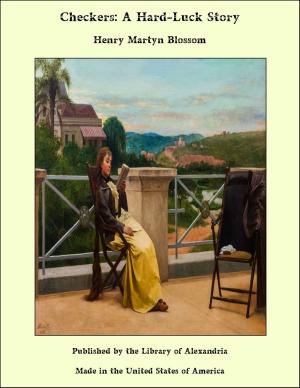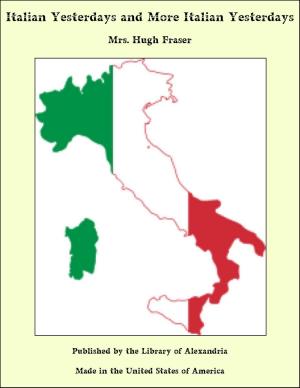Letters to Eugenia Or, a Preservative Against Religious Prejudices
Nonfiction, Religion & Spirituality, New Age, History, Fiction & Literature| Author: | Baron d' Paul Henri Thiry Holbach | ISBN: | 9781465513250 |
| Publisher: | Library of Alexandria | Publication: | March 8, 2015 |
| Imprint: | Language: | English |
| Author: | Baron d' Paul Henri Thiry Holbach |
| ISBN: | 9781465513250 |
| Publisher: | Library of Alexandria |
| Publication: | March 8, 2015 |
| Imprint: | |
| Language: | English |
NAIGEON'S 1768. For many years this work has been known under the title of Letters to Eugenia. The secretive character of those, however, into whose hands the manuscript at first fell; the singular and yet actual pleasure that is caused generally enough in the minds of all men by the exclusive possession of any object whatever; that kind of torpor, servitude, and terror in which the tyrannical power of the priests then held all minds--even those who by the superiority of their talents ought naturally to be the least disposed to bend under the odious yoke of the clergy,--all these circumstances united contributed so much to stifle in its birth, if I may so express myself, this important manuscript, that for a long time it was supposed to be lost; so much did those who possessed it keep it carefully concealed, and so constantly did they refuse to allow a copy to be taken. The manuscripts, indeed, were so scarce, even in the libraries of the curious, that the late M. De Boze, whose pleasure it was to collect the rarest works belonging to every species of literature, could never succeed in acquiring a copy of the Letters to Eugenia, and in his time there were only three in Paris; it may have been from design, propter metum Judaeorum;* it may have been there were actually no more known. * On account of fear of the Jews, or, in Other words, the intolerant clergy of the despotic government. It is not till within five or six years that MSS. of these letters have become more common; and there is reason to believe that they are now considerably multiplied, since the copy from which this edition is printed has been revised and corrected by collation with six Others, that have been collected without any great difficulty. Unhappily, all these copies swarm with faults, which corrupt the sense, and comprehend many variations, but which also, to use the language of the Biblical critics, have served sometimes to discover and to fix the true reading! More often, however, they have rendered it more uncertain than it was before what one ought to be followed--a new proof of the multiplicity of copies, because the more numerous are the manuscripts of a work, the more they differ from each Other, as any one may be fully convinced by consulting those of the Letter of Thrasybulus to Leucippus, and the various readings of the New Testament collected by the learned Mill, and which amount to more than thirty thousand. However this may be, we have spared no pains to reestablish the text in all its purity; and we venture to say, that, with the exception of four or five passages, which we found corrupted in all the manuscripts that we had an opportunity to collate, and which we have amended to the best of our ability, the edition of these letters that we now offer to the reader will probably conform almost exactly with the original manuscript of the author
NAIGEON'S 1768. For many years this work has been known under the title of Letters to Eugenia. The secretive character of those, however, into whose hands the manuscript at first fell; the singular and yet actual pleasure that is caused generally enough in the minds of all men by the exclusive possession of any object whatever; that kind of torpor, servitude, and terror in which the tyrannical power of the priests then held all minds--even those who by the superiority of their talents ought naturally to be the least disposed to bend under the odious yoke of the clergy,--all these circumstances united contributed so much to stifle in its birth, if I may so express myself, this important manuscript, that for a long time it was supposed to be lost; so much did those who possessed it keep it carefully concealed, and so constantly did they refuse to allow a copy to be taken. The manuscripts, indeed, were so scarce, even in the libraries of the curious, that the late M. De Boze, whose pleasure it was to collect the rarest works belonging to every species of literature, could never succeed in acquiring a copy of the Letters to Eugenia, and in his time there were only three in Paris; it may have been from design, propter metum Judaeorum;* it may have been there were actually no more known. * On account of fear of the Jews, or, in Other words, the intolerant clergy of the despotic government. It is not till within five or six years that MSS. of these letters have become more common; and there is reason to believe that they are now considerably multiplied, since the copy from which this edition is printed has been revised and corrected by collation with six Others, that have been collected without any great difficulty. Unhappily, all these copies swarm with faults, which corrupt the sense, and comprehend many variations, but which also, to use the language of the Biblical critics, have served sometimes to discover and to fix the true reading! More often, however, they have rendered it more uncertain than it was before what one ought to be followed--a new proof of the multiplicity of copies, because the more numerous are the manuscripts of a work, the more they differ from each Other, as any one may be fully convinced by consulting those of the Letter of Thrasybulus to Leucippus, and the various readings of the New Testament collected by the learned Mill, and which amount to more than thirty thousand. However this may be, we have spared no pains to reestablish the text in all its purity; and we venture to say, that, with the exception of four or five passages, which we found corrupted in all the manuscripts that we had an opportunity to collate, and which we have amended to the best of our ability, the edition of these letters that we now offer to the reader will probably conform almost exactly with the original manuscript of the author
